全新版大学英语综合教程Unit5-1教案、讲稿
- 格式:doc
- 大小:77.00 KB
- 文档页数:6
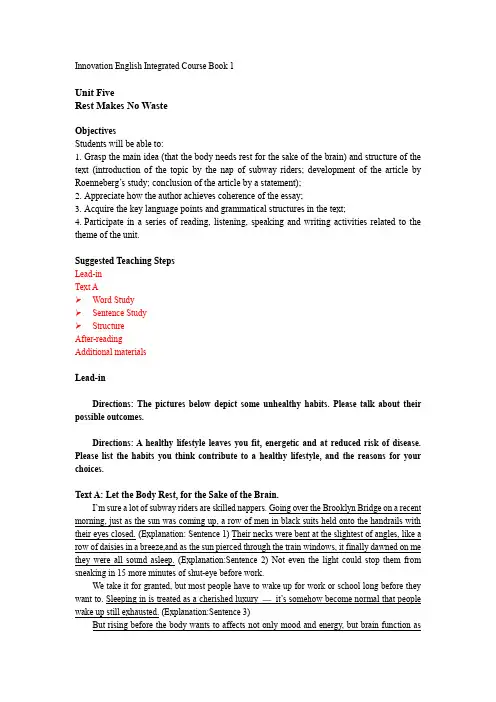
Innovation English Integrated Course Book 1Unit FiveRest Makes No WasteObjectivesStudents will be able to:1.Grasp the main idea (that the body needs rest for the sake of the brain) and structure of the text (introduction of the topic by the nap of subway riders; development of the article by Roenneberg’s study; conclusion of the article by a statement);2.Appreciate how the author achieves coherence of the essay;3.Acquire the key language points and grammatical structures in the text;4.Participate in a series of reading, listening, speaking and writing activities related to the theme of the unit.Suggested Teaching StepsLead-inText A➢Word Study➢Sentence Study➢StructureAfter-readingAdditional materialsLead-inDirections: The pictures below depict some unhealthy habits. Please talk about their possible outcomes.Directions: A healthy lifestyle leaves you fit, energetic and at reduced risk of disease. Please list the habits you think contribute to a healthy lifestyle, and the reasons for your choices.Text A: Let the Body Rest, for the Sake of the Brain.I’m sure a lot of subway riders are skilled nappers. Going over the Brooklyn Bridge on a recent morning, just as the sun was coming up, a row of men in black suits held onto the handrails with their eyes closed.(Explanation: Sentence 1) Their necks were bent at the slightest of angles, like a row of daisies in a breeze,and as the sun pierced through the train windows, it finally dawned on me they were all sound asleep. (Explanation:Sentence 2) Not even the light could stop them from sneaking in 15 more minutes of shut-eye before work.We take it for granted, but most people have to wake up for work or school long before they want to. Sleeping in is treated as a cherished luxury —it’s somehow become normal that people wake up still exhausted.(Explanation:Sentence 3)But rising before the body wants to affects not only mood and energy, but brain function aswell.(Explanation:Sentence 4)“The practice of going to sleep and waking up at 'unnatural’ times could be the most common high-risk behavior in modern society,” writes Till Roenneberg, a professor at the Institute of Medical Psychology at Ludwig-Maximilians University in Munich.In fact, according to Roenneberg’s study, about one-third of people are required to wake up two hours before their “natural waking times”, and 69 percent of people have to wake up one hour before their bodies would like them to.Of course, different people require different amounts of sleep and although there's no universal rule for how long we should all be sleeping, it’s becoming increasingly clear that working late and waking early can cause serious problems.(Explanation:Sentence 5) Just one restless night can seriously affect us in the morning.Getting less than five hours of sleep a night makes people dumber and less able to concentrate, and it can make people more likely to have false memories. In the classroom, students who sleep more in the previous day tend to be better at remembering what they've learned than those who slept less, according to a 2001 study published in Science, and a 2014 study confirmed that more sleep leads to higher exam scores as well.(Explanation:Sentence 6) Students who slept seven hours the night before an exam that tested them on economics, languages, and math, scored an average of 9 percent higher than students who only slept six hours the night before.(Explanation:Sentence 7) But there is the possibility of overriding the mind and body’s desire for sleep. (Explanation:Sentence 8) By simply telling themselves they've slept well, studies show that people can temporarily trick their brains. Of course, continually getting too few hours of shut-eye will eventually cause problems, but telling yourself you got more sleep and that you feel refreshed (even if you don’t) leads to better performance in the morning. (Explanation:Sentence 9) The sleeping subway riders were also onto something. Even after a terrible night’s sleep, a 10-minute nap can significantly increase short-term alertness and improve problem-solving skills. (Explanation:Sentence 10)As we reached the Chambers Street subway station,the row of suited men and women seemed to instinctively know that they had arrived at their stop. They began to open their eyes and force themselves awake. Some gave themselves little slaps on their cheeks; others rubbed their eyes.Then, their backs straightened, their gazes turned straight ahead and they grasped their brief cases and stepped out the door, up the stairs, and out onto the street already noisy and awake.Word StudyWord Study: piercepierce: v. if sound or light pierces sth., you suddenly hear or see it (声或光)穿过,透入e.g. A sudden scream pierced the silence.突如其来的一声尖叫划破了寂静。
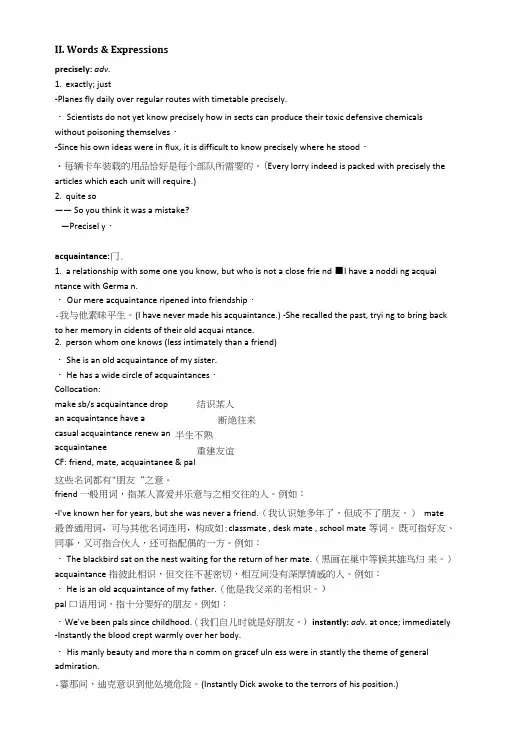
II. Words & Expressionsprecisely: adv.1. exactly; just-Planes fly daily over regular routes with timetable precisely.・ Scientists do not yet know precisely how in sects can produce their toxic defensive chemicals without poisoning themselves ・-Since his own ideas were in flux, it is difficult to know precisely where he stood ・・每辆卡车装载的用品恰好是每个部队所需要的。
(Every lorry indeed is packed with precisely the articles which each unit will require.)2. quite so—— So you think it was a mistake?—Precisel y ・acquaintance:门.1. a relationship with some one you know, but who is not a close frie nd ■I have a noddi ng acquai ntance with Germa n.・ Our mere acquaintance ripened into friendship ・-我与他素昧平生。
(I have never made his acquaintance.) -She recalled the past, tryi ng to bring back to her memory in cidents of their old acquai ntance.2. person whom one knows (less intimately than a friend)・ She is an old acquaintance of my sister.・ He has a wide circle of acquaintances ・Collocation:make sb/s acquaintance drop an acquaintance have a casual acquaintance renew an acquaintanee CF: friend, mate, acquaintanee & pal这些名词都有"朋友“之意。
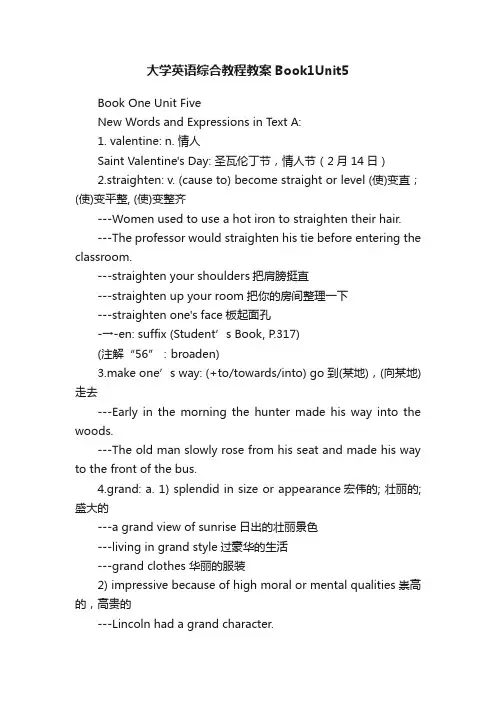
大学英语综合教程教案Book1Unit5Book One Unit FiveNew Words and Expressions in Text A:1. valentine: n. 情人Saint Valentine's Day: 圣瓦伦丁节,情人节(2月14日)2.straighten: v. (cause to) become straight or level (使)变直;(使)变平整, (使)变整齐---Women used to use a hot iron to straighten their hair.---The professor would straighten his tie before entering the classroom.---straighten your shoulders把肩膀挺直---straighten up your room把你的房间整理一下---straighten one's face板起面孔-→-en: suffix (Student’s Book, P.317)(注解“56”:broaden)3.make one’s way: (+to/towards/into) go 到(某地),(向某地)走去---Early in the morning the hunter made his way into the woods.---The old man slowly rose from his seat and made his way to the front of the bus.4.grand: a. 1) splendid in size or appearance宏伟的; 壮丽的; 盛大的---a grand view of sunrise日出的壮丽景色---living in grand style过豪华的生活---grand clothes 华丽的服装2) impressive because of high moral or mental qualities崇高的,高贵的---Lincoln had a grand character.---grand ladies贵妇3) full, complete完全的;总的---the grand total全部;总共4) of most or greatest importance最重要的--- the grand ballroom of a hotel 旅馆的主舞厅5) wonderful or very pleasing 愉快的,令人非常高兴的---had a grand time度过美好时光5.absorb: vt. 1) (be absorbed in) completely hold the attention of (sb.); 完全吸引住…的注意---I was so absorbed in the detective story that I jumped up when someone patted me on the back. ---T otally absorbed in writing the computer software, Michael ordered take-out food when he was hungry, slept on the office floor when tired out.2) take in吸收, 理解---I haven’t really had time to absorb everything that my teacher said in class.---The moon has a rough surface that absorbs most of the sunlight that strikes (到达) it.6.margin: n. (c) one or both sides of a page near the edge, where there is no writing or printing页边空白---Chairman Mao had the habit of making notes in the margin of the books he was reading.---Some publishers make profits by printing books with wider margins and hence charging greater prices.--- top margin【出版】书眉--- bottom margin页脚, 书页下边空白7.handwriting: n. (u) 笔迹,书法;手写稿--- current handwriting草书[体]8.reflect:1) vt. be a sign of, show 反映,显示,表达---Election results should reflect people’s opinions.---Rising prices may reflect the rise in demand for these goods.---Does this letter reflect how you really think?这封信是否表达了你真实的想法?---Baseball reflects America's history. 棒球反映出美国的历史---Her work reflects intelligence. 她的工作显示出她的智慧2) vt. (of surface) throw back (light, heat, sound); (of a mirror) send back an image of(指表面) 反射(光、热、声);(指镜子) 反映…的像---The sunlight was reflected from the water.日光由水面反射出来---trees reflected in the lake---The pavement reflects heat on a hot day.在热天里, 人行道反射热气。
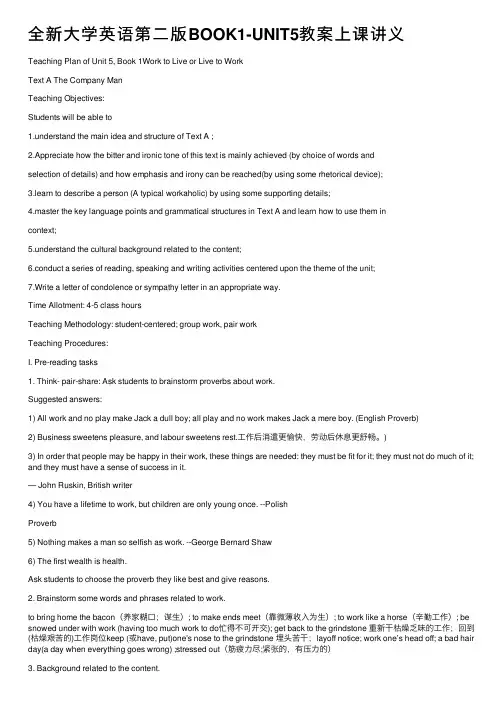
全新⼤学英语第⼆版BOOK1-UNIT5教案上课讲义Teaching Plan of Unit 5, Book 1Work to Live or Live to WorkText A The Company ManTeaching Objectives:Students will be able to1.understand the main idea and structure of Text A ;2.Appreciate how the bitter and ironic tone of this text is mainly achieved (by choice of words andselection of details) and how emphasis and irony can be reached(by using some rhetorical device);3.learn to describe a person (A typical workaholic) by using some supporting details;4.master the key language points and grammatical structures in Text A and learn how to use them incontext;5.understand the cultural background related to the content;6.conduct a series of reading, speaking and writing activities centered upon the theme of the unit;7.Write a letter of condolence or sympathy letter in an appropriate way.Time Allotment: 4-5 class hoursTeaching Methodology: student-centered; group work, pair workTeaching Procedures:I. Pre-reading tasks1. Think- pair-share: Ask students to brainstorm proverbs about work.Suggested answers:1) All work and no play make Jack a dull boy; all play and no work makes Jack a mere boy. (English Proverb)2) Business sweetens pleasure, and labour sweetens rest.⼯作后消遣更愉快,劳动后休息更舒畅。
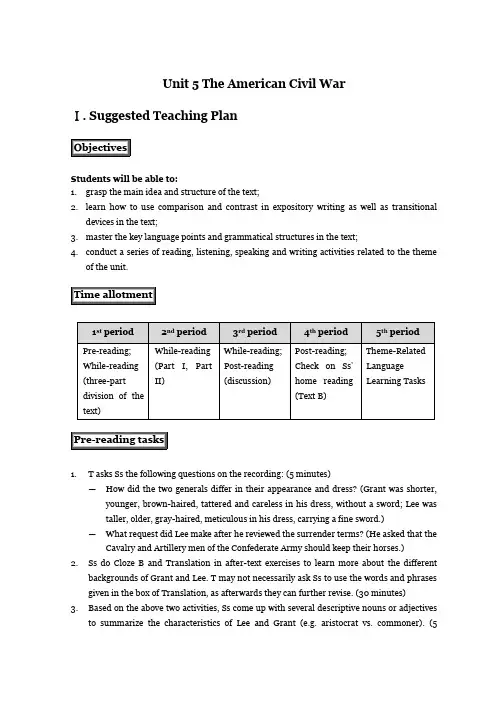
Unit 5 The American Civil WarⅠ. Suggested Teaching PlanStudents will be able to:1.grasp the main idea and structure of the text;2.learn how to use comparison and contrast in expository writing as well as transitionaldevices in the text;3.master the key language points and grammatical structures in the text;4.conduct a series of reading, listening, speaking and writing activities related to the themeof the unit.1.T asks Ss the following questions on the recording: (5 minutes)—How did the two generals differ in their appearance and dress? (Grant was shorter, younger, brown-haired, tattered and careless in his dress, without a sword; Lee was taller, older, gray-haired, meticulous in his dress, carrying a fine sword.) —What request did Lee make after he reviewed the surrender terms? (He asked that the Cavalry and Artillery men of the Confederate Army should keep their horses.)2.Ss do Cloze B and Translation in after-text exercises to learn more about the differentbackgrounds of Grant and Lee. T may not necessarily ask Ss to use the words and phrases given in the box of Translation, as afterwards they can further revise. (30 minutes)3.Based on the above two activities, Ss come up with several descriptive nouns or adjectivesto summarize the characteristics of Lee and Grant (e.g. aristocrat vs. commoner). (5minutes)1.Ss do Text Analysis Exercise 1, and then T dictates to them the main ideas of the threeparts. (10 minutes)2.T explains the language points in Part I and has Ss practice them, (see Language Study)(10 minutes)3.T asks Ss to scan Part II to locate the introduction paragraph and conclusion paragraphherein (Para 3 and Para 12, respectively). Then T calls their attention to the transitional devices used by the author here. (10 minutes)4.Ss finish Text Analysis Exercise 3. (5 minutes)5.T explains the language points in Part II and has Ss practice them, (see Language Study)(25 minutes)6.T asks Ss to scan Part III and tell what Grant and Lee had in common. Then again T asksthem to note the transitional devices used in this part. (10 minutes)7.T explains the language points in Part III and has Ss practice them, (see LanguageStudy) (15 minutes)1.Discussion and out-of-class research: (20 minutes)1)Ss spend some time in class discussing in groups what Grant and Lee might do afterthe war, based on each person’s background, beliefs, previous experiences, etc.2)Several groups report to class.3)Ss form groups to do an out-of-class research project to find out what actuallyhappened to Grant and Lee after the Civil War.4)T may check on their research results during the next meeting.2.T guides Ss through some after-text exercises. (30 minutes)3.T checks on Ss’ home read ing (Text B). (3 minutes)4.Ss do Part IV: Theme-Related Language Learning Tasks. (1 period)5.T asks Ss to prepare for the next unit: (2 minutes)1)do the pre-reading task;2)preview Text A.Ⅱ. Cultural Notes1. Ulysses S. Grant (1822-1885): the general who commanded the US Army during the CivilWar and later became the 18th President of the US (1869-1877). His greatest Civil War victory was at Vicksburg, Mississippi, and he accepted the surrender of Robert E Lee at Appomattox Court House. Grant was a Republican. He was not a successful president because he failed to stop the illegal actions of some of the friends he had appointed to office. His two volumes of personal memoirs are among the best military books ever written.2. Robert E. Lee (1807-1870): the leader of the armies of the Confederate States during the American Civil War. He was respected for his honor and kindness. General Lee won many battles against the larger Union armies, including the second battle of Bull Run and Chancellorsville. He lost at Gettysburg, however, and soon afterwards surrendered to General Grant at Appomattox Court House. Before the Civil War, President Lincoln asked him to lead the US armies, but Lee was loyal to his state of Virginia and joined the South. After the war, he became president of Washington College, later renamed Washington and Lee College.3. Confederacy: the 11 southern states that left the Union in 1861 to form a new nation. This caused the American Civil War. The President of the Confederate States was Jefferson Davis and their capital city was first Montgomery, Alabama and later Richmond, Virginia. The Confederate States, in their order of leaving the Union, were South Carolina, Mississippi, Florida, Alabama, Georgia, Louisiana, Texas, Virginia, Arkansas, Tennessee and North Carolina.4. Appomattox Court House: a former small community in the state of Virginia where the American Civil War ended. General Robert E Lee of the Confederate States surrendered on 9 April 1865 to General Ulysses S Grant in a private house. The area is now a national historical park.5. the battle of Chancellorsville: a major battle (1-5 May 1863) fought in Virginia during the American Civil War. The South, led by Robert E Lee and Thomas Stonewall Jackson, defeateda large northern army. More than 30,000 soldiers died in the battle, including Jackson himself.6. Vicksburg: a city on the Mississippi River in the state of Mississippi. During the Civil War it was captured by the army of General Grant after a seven-month siege. This gave the Union control of the river and split the Confederate States. The Vicksburg National Military Park is a popular tourist attraction today.Ⅲ. Language Study1.chapter: any distinct period in history or in a person’s life; a subdivision of a written work; usually numbered and titledExamples: The whole period leading up to the revolution is an interesting chapter in British history.He began a new chapter in life when he entered university.Chapter six is all about the solar system.2. to be sure: admittedly, I can’t denyExamples: To be sure, the SARS epidemic has brought about some negative effect on oureconomy.To be sure, there exist some differences between men and women.3. vainly: unsuccessfully; uselesslyExamples: He tried vainly to make them listen to him.If this fighting finally brings peace to the area, the soldiers will not have died vainly. 4. in effect: in fact, although perhaps not appearing soExamples: The two viruses are, in effect, identical.It sounds as if I am getting a pay rise, but in effect I’m losing money.5. write out: write (sth. formal); write especially in a full and complete formExamples: It’s just in note form but I’ll write it out prope rly for you later.If you wait a minute, I’ll write you out a receipt.6. poignant: deeply moving, highly emotional; producing a sharp feeling of sadness Examples: The picture awakens poignant memories of happier days.It is especially poignant that he died the day before his wedding.7. collision: the act of coming into disagreement or striking togetherExamples: The play represents the collision of three generations.Two drivers were killed in a direct collision between a car and a taxi last night.8. embody: representExamples: She embodied good sportsmanship on the playing field.His song embodied the spirit of the age.9. ownership: the right or state of being an ownerExamples: Do you have any proof of ownership of / for this car?The enterprises were transferred out of public and into private ownership.10. key: adjust; lock with a keyExamples: The books are keyed to the interests of very young children.I taught my daughter how to key the door.11. bring forth: give rise to; produceExamples: Why di dn’t you bring forth your suggestion at the meeting yesterday?Lots of trees bring forth fruit.12. solemn: deeply earnest; serious; grave; formalExamples: I give you my solemn promise that I will do everything I can to help you.Her solemn little face broke into smiles. The memorial service was a very solemnoccasion.13. obligation: sth. which must be done because of a duty or promiseExamples: If you have not signed a contract, you are under no obligation to pay them any money.You have a legal obligation to ensure your child receives a proper education.14. leadership: the body of people who lead a group; the activity of leading; the ability to leadExamples: There is growing discontent with the leadership.The election for the leadership of the council will take place on Tuesday.The group flourished under her firm leadership.He lacks leadership qualities.15. virtue: any admirable qualityExamples: Humility is considered a virtue.Her flaws were as large as her virtues.16. ideal: the idea of sth. that is perfect; sth. that one hopes to attainExamples: My ideal is to have a home in town and another in the country.A gold medal would be my ideal, but I’ll be satisfied with any medal.17. in the end: finallyExamples: We were thinking about going to New York, but in the end we went to Los Angeles.I toyed with the idea of calling the police, but in the end, I didn’t.18.enthusiasm: passion (followed by for)Examples: One of the good things about teaching young children is their enthusiasm to learn things.After the accident he lost his enthusiasm for the sport.19. come up: become more successful in your job, or to achieve a better position in societyExamples: He’s just been made the manager of the Personnel Department —he’s really coming up in the world.world.From a carpenter to the manager of the famous company, he came up the hard way.20. the hard way: in the most difficult way, at a great costExamples: She always does things the hard way.I got the PhD the hard way.21. to a fault: to an exceptional degreeExamples: She’s a really sweet person and she’s generous to a fault.Kind to a fault, she forgave that unfaithful husband of hers.22. surge: a sudden forward movement; a sudden occurrenceExamples: At the end of the game, there was a surge of fans onto the field.A tidal surge caused severe flooding in the coastal areas.23. implicit: undeclared, unexpressedExamples: He interpreted her comments as an implicit criticism of the government.I took his silence for implicit agreement.24. groove: a settled routine that is hard to escapeExamples: We never do anything exciting any more — we seem to be stuck in a groove.Things just go along in the same old groove.25. set up shop / in business: establish one’s business operati onsExamples: Sam Walton set up shop in 1962 with a small store.They set up shop in a small building but soon expanded.26. prosper: gain in wealth; grow strongerExamples: A lot of microchip manufacturing companies prospered last year.Our business has just started to prosper.27. accessible: capable of being reached; easy to reach (followed by to)Examples: The resort is easily accessible by road, rail and air.Foreign newspapers and magazines are accessible to everyone at the local library. 28. in relation to: with respect toExamples: All our positions are filled in relation to your question about jobs.I have nothing to say in relation to the price of these computers.29. static: not acting or changingExamples: Oil prices have remained static for the last few months.The workers are complaining that their wages have remained static for four years.30. tenacity: the determination to continue what one is doing (uncountable noun)Examples: Talent, hard work, and sheer tenacity are all crucial to career success.Medical staff fought against the epidemic with tenacity.31. widen: become broader or wider or more extensive; make widerExamples: Traveling certainly widens your horizons.As it approaches the sea, the river begins to widen.32. stand by: not act or do anythingExamples: We can’t stand by while millions of people starve.We can’t stand by and let these kids be ill-treated.33. vitality: the property of being able to survive and growExamples: Without continued learning, graduates will lose their intellectual vitality.China’s reforms have brought vitality to its economy.34.champion: a person who has worked hard in support of a particular cause or principle; aperson who defeats all others in a contest, competition or tournamentExamples: Martin Luther King is considered one of the leading champions of the civil rights movement.She is the world champion for the third year in succession.35. personality: the type of person you are, which is shown by the way you behave, feel and thinExamples: He is well qualified for the job technically speaking, but he does lack personality (=he is a boring per boring person).They have three children, all with quite different personalities.36. underlying: in the nature of sth. though not immediately obvious; fundamentalExamples: I think that the underlying problem is the high rate of unemployment.To solve a problem you have to understand its underlying causes.37. aspiration: a strong desire to achieve sth. high or greatExamples: The presidency had been her aspiration since college.He has aspirations to become a great writer.38. to begin with: in the first placeExamples: The hotel was awful! To begin with, our room was far too small. Then we found that the shower didn’t work.It can’t be done. To begin with, there’s no time to plan it, and secondly, we haven’tgot enough men.39. indomitable: (of a person) strong, brave, and impossible to defeatExamples: She was viewed as a woman of indomitable will.Facing the threat of death the rescuers displayed an indomitable spirit.40. refusal: a case of refusing to do, accept, or allow sth.Examples: Our request for permission to travel there met with a refusal from the authorities.Their refusal to negotiate with us made progress difficult.41. reconciliation: the reestablishing of cordial relations (followed by between / with / of)Examples: It took hours of negotiations to bring about a reconciliation between the two sides.The couple have separated but he wants a reconciliation.42. wholly: to a complete degree or to the full or entire extentExamples: It’s a machine that is wholly British-made.To be fair, it’s not wholly her fault.。
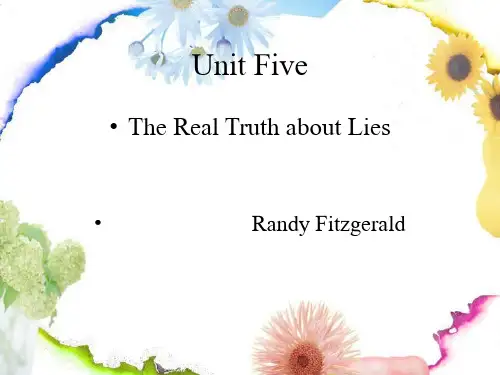
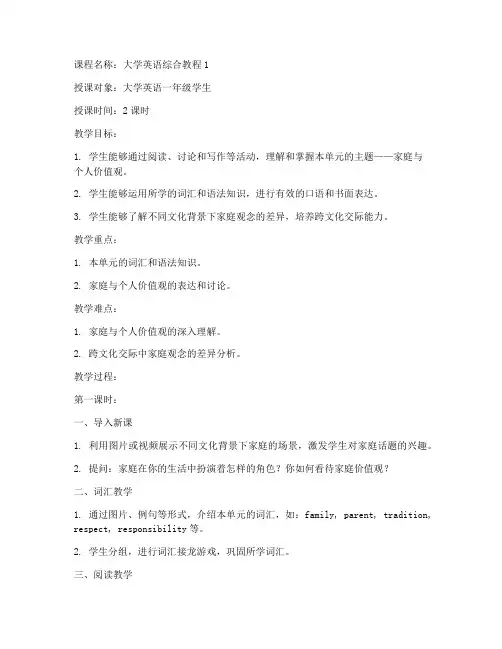
课程名称:大学英语综合教程1授课对象:大学英语一年级学生授课时间:2课时教学目标:1. 学生能够通过阅读、讨论和写作等活动,理解和掌握本单元的主题——家庭与个人价值观。
2. 学生能够运用所学的词汇和语法知识,进行有效的口语和书面表达。
3. 学生能够了解不同文化背景下家庭观念的差异,培养跨文化交际能力。
教学重点:1. 本单元的词汇和语法知识。
2. 家庭与个人价值观的表达和讨论。
教学难点:1. 家庭与个人价值观的深入理解。
2. 跨文化交际中家庭观念的差异分析。
教学过程:第一课时:一、导入新课1. 利用图片或视频展示不同文化背景下家庭的场景,激发学生对家庭话题的兴趣。
2. 提问:家庭在你的生活中扮演着怎样的角色?你如何看待家庭价值观?二、词汇教学1. 通过图片、例句等形式,介绍本单元的词汇,如:family, parent, tradition, respect, responsibility等。
2. 学生分组,进行词汇接龙游戏,巩固所学词汇。
三、阅读教学1. 学生阅读课文,了解文章大意。
2. 教师引导学生分析文章结构,提炼出文章的主旨大意。
3. 学生讨论文章中的观点,表达自己的看法。
四、语法教学1. 介绍本单元的语法知识,如:现在进行时、过去完成时等。
2. 学生通过例句练习,掌握语法知识。
五、课堂小结1. 教师总结本节课所学内容,强调重点和难点。
2. 学生回顾所学词汇和语法知识。
第二课时:一、复习导入1. 回顾上一节课所学内容,检查学生对词汇和语法的掌握情况。
2. 学生进行口语练习,用所学词汇和语法知识描述家庭生活。
二、写作教学1. 学生根据课文内容,撰写一篇关于家庭价值观的短文。
2. 教师指导学生修改作文,注意语法、词汇和表达方式。
三、课堂讨论1. 学生分组讨论,分享自己对家庭价值观的看法。
2. 教师引导学生分析不同文化背景下家庭观念的差异。
四、课堂小结1. 教师总结本节课所学内容,强调家庭价值观的重要性。
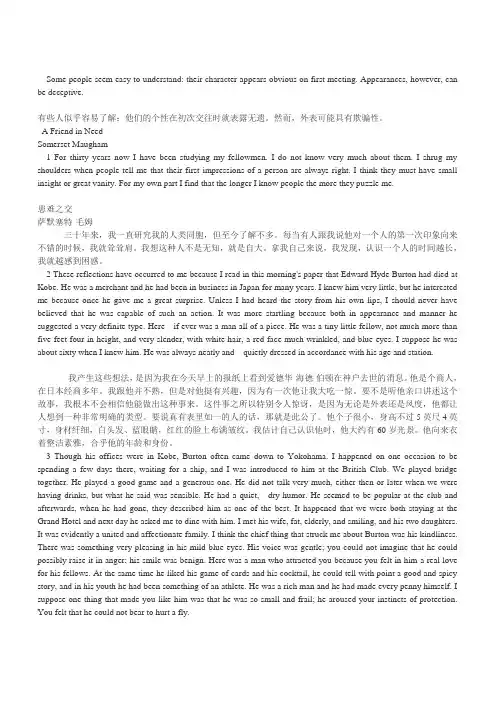
Some people seem easy to understand: their character appears obvious on first meeting. Appearances, however, can be deceptive.--------------------------------------------------------------------------------有些人似乎容易了解:他们的个性在初次交往时就表露无遗。
然而,外表可能具有欺骗性。
A Friend in NeedSomerset Maugham1 For thirty years now I have been studying my fellowmen. I do not know very much about them. I shrug my shoulders when people tell me that their first impressions of a person are always right. I think they must have small insight or great vanity. For my own part I find that the longer I know people the more they puzzle me.--------------------------------------------------------------------------------患难之交萨默塞特·毛姆三十年来,我一直研究我的人类同胞,但至今了解不多。
每当有人跟我说他对一个人的第一次印象向来不错的时候,我就耸耸肩。
我想这种人不是无知,就是自大。
拿我自己来说,我发现,认识一个人的时间越长,我就越感到困惑。
2 These reflections have occurred to me because I read in this morning's paper that Edward Hyde Burton had died at Kobe. He was a merchant and he had been in business in Japan for many years. I knew him very little, but he interested me because once he gave me a great surprise. Unless I had heard the story from his own lips, I should never have believed that he was capable of such an action. It was more startling because both in appearance and manner he suggested a very definite type. Here if ever was a man all of a piece. He was a tiny little fellow, not much more than five feet four in height, and very slender, with white hair, a red face much wrinkled, and blue eyes. I suppose he was about sixty when I knew him. He was always neatly and quietly dressed in accordance with his age and station.--------------------------------------------------------------------------------我产生这些想法,是因为我在今天早上的报纸上看到爱德华·海德·伯顿在神户去世的消息。
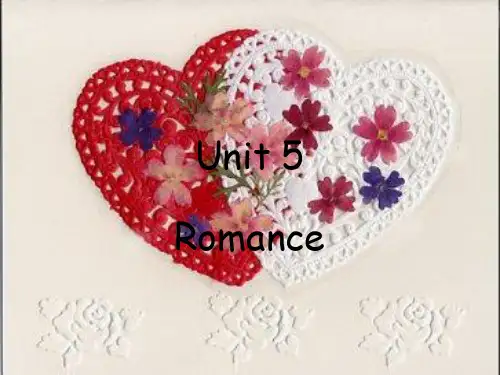
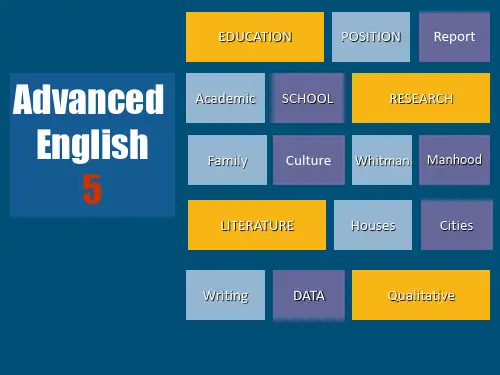
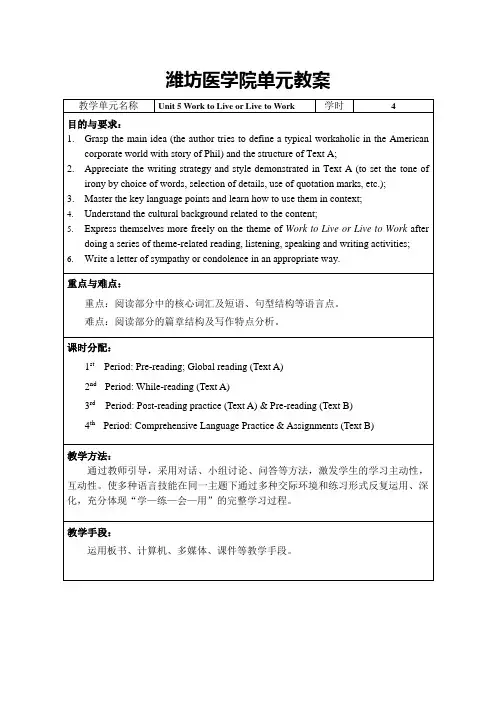
(全新版)大学英语《综合教程》第一册Unit5 (Unit 5)In today's fast-paced world, the importance of learning English cannot be overstated. English has become a universal language, connecting people from different cultures and backgrounds. As an integral part of the curriculum, the "Comprehensive Tutorial" series of textbooks aims to provide students with a solid foundation in the English language. In this article, we will explore the key features and benefits of the newest edition of the "Comprehensive Tutorial" series, specifically focusing on Unit 5.Unit 5 of the "Comprehensive Tutorial" series introduces students to the theme of "Education." This unit aims to enhance students' language skills while also providing them with valuable knowledge about the education system and its challenges. The unit comprises various sections, each targeting different language aspects and addressing specific educational topics.One of the highlights of Unit 5 is its focus on vocabulary expansion. The unit includes a wide range of academic and educational vocabulary words that students can incorporate into their everyday language use. From "curriculum" to "plagiarism," students will gain a comprehensive understanding of essential terms related to education. Numerous exercises and activities within the unit make it possible for students to actively engage with the new vocabulary and reinforce their learning through practice.Furthermore, Unit 5 also emphasizes writing skills. It includes a section dedicated to academic writing, guiding students through the process ofconstructing well-structured essays. The unit introduces students to various types of essays commonly encountered in an academic setting, such as argumentative essays and descriptive essays, providing them with a step-by-step approach to master each style. By following the provided guidelines and practicing the given exercises, students can enhance their writing abilities and prepare themselves for future academic challenges.In addition to vocabulary expansion and writing skills, Unit 5 also focuses on developing students' listening and speaking skills. Through a variety of authentic recordings and interviews, students are exposed to real-life situations related to education. They have the opportunity to listen to different accents and improve their listening comprehension skills. The unit also incorporates interactive speaking activities, enabling students to engage in discussions and express their opinions on a range of educational topics. These activities foster a collaborative learning environment, encouraging students to actively participate and communicate in English.Another unique component of Unit 5 is its incorporation of cultural insights. The unit explores the significance of education in different cultures around the world, shedding light on educational practices, beliefs, and traditions from diverse perspectives. By understanding the cultural nuances associated with education, students develop a global mindset and become more open-minded individuals.To enhance self-assessment and independent learning, Unit 5 includes regular self-evaluation exercises and a comprehensive review section at the end of the unit. These features allow students to gauge their progress,identify areas of improvement, and reinforce their understanding of the unit's content.In conclusion, Unit 5 of the "Comprehensive Tutorial" series offers a comprehensive and engaging approach to learning English in the context of education. Through its focus on vocabulary expansion, writing skills, listening and speaking abilities, cultural insights, and self-assessment, the unit equips students with the necessary tools to excel in their language learning journey. The newest edition of the textbook serves as a valuable resource for both teachers and students, providing a solid foundation for developing a strong command of the English language.。
Unit Five RomancePreview assignment:1.Try to find the information about the legend of St. Valentine’s Day.2.Preview the new words and expressions in the two texts.3.Read text A, appreciating the romantic story.Objectives:Students will be able to:1.grasp the main idea (the nature of a heart is seen in its response to the unattractive) and structure of the text;2.appreciate the narrative skills demonstrated in the text (switch between tenses, change of narrators), somerhetorical devices (simile and metaphor) and the use of informal language in conversations;3.master the key language points and grammatical structures in the text.I. Introduction to the unit:Love is the eternal theme in both literature and real life. Throughout the ages, people from around the world pursue the true affection between man and woman, leaving us many touching love stories, such as Romeo and Juliet,Butterfly Lovers, Titanic etc. Today in Unit F ive, we’ll appreciate another two moving love stories. Despite the different heroes and heroines, both stories tell us a fact, that is, in order to win the true love, you should be able to resist temptation and stand the test; and you must be patient because winning the true love sometimes needs your whole life’s waiting. Now, let’s take a look at our first love story, A Valentine Story in Text A.As the title denotes, it tends to be related to Valentine’s Day. St. Valentine’s Day is also called lover’s day. It is celebrated on February 14 th . On this day across the country, candy, flowers and gifts are exchanged between loved ones, all in the name of St. Valentine. There is a legend about this lover’s day. But here in the text, A Valentine Story has nothing to do with the origin of the lover’s Day, but only to refer to the day the hero and heroine first meet.II. Check on the previewed work (ask students to tell the legend of St. Valentine’s Day) Valentine was a priest living in Rome during the third century. At that time, Rome was ruled by an emperor named Claudius. He wanted to have a big army and expected men to volunteer to join. However many men just did not want to fight in wars. They did not want to leave their wives and families. This made Claudius very angry. He thought that if men were not married, they would not mind joining the army. So Claudius banned marriage even engagement from his empire. But Valentine would keep on performing marriage ceremonies secretly. He was caught by the soldiers at a wedding, and was thrown into prison and beheaded.V alentine fell in love with the daughter of his jailer when he was in prison. Before he was taken to his death on February 14, 269 A.D., he signed a farewell message to her, “Love from your Valentine.”That note started the custom of exchanging love messages on Valentine’s Day.III.DiscussionAmong the following topics, you may choose any one of them and discuss with your partner, then, exchange your opinion with another two classmates. In the end, you are supposed to recommend several students to present your ideas to the whole class.1.What’s your criterion for choosing your Mr./Ms. Right ? In other words, what do you think your futurehusband or wife will be like? Which do you concern most, appearance, wealth, wisdom or other virtues?As we all know, we can’t sometimes get both fish and bear’s paw; in this case, will you choose someone eye-entertaining or heart-entertaining?2.Do you have any key pal? Do you think it wise to develop friendship or even love with a key pal? Whyor why not?3.Tell us a touching love story you’ve ever read or heard.IV. Teacher sums up and leads into the text by saying:Pursuing one’s lifelong companion is a compulsory course, which is much more important than learning our dear English language. Your course of pursuit also can reflect your personality, just like Houssaye---- A French Louisiana author said “Tell me whom you love and I w ill tell you who you are.”I hope you will be happy infuture. So let’s examine the text and find out how the hero and heroine win their true love. I hope we can learn something and it will be helpful for you!From the exercise, Text Organization on page143, we know that the text can be divided into four parts according to the changes in tense or narrator, now let’s find out the main ideas of each part by answering some1.Students read part one together aloud, and answer the following questions.1).What’s the hero’s name and what’s he doing and what’s his job? (How do you know?) Do you thinkthe person he is expecting is very important? (Maybe. From the phrase “straightened his Army uniform”we can know he is a soldier and he is serious)2. Ask several students to read part two and answer these questions:1) What kind of girl did John Blanchard look for?He looked for the girl whose heart he knew, but whose face he didn’t. (this arouse the reader’s curiosity) Paraphrase the sentence: He tried to find the girl who shared many of his views , interests and feelings but who he had never met before.2) How would John recognize Hollis at their first meeting?She would be wearing a red rose on her lapel.3) How had John and Hollise come to know each other? Students may skim this part again and formpairs to retell in their own words or in the following words (write them on the blackboard) absorb, in the margin, thoughtful soul and insightful mind, previous, with time and effort, locate, correspond.John was attracted by Hollis’s notes on the book in a Florida library then he located her address inNew York and invited her to correspond.4) What had kept John from meeting her?He was shipped overseas for service in World War II.5) How long had they written to each other previous to their first meeting? (one year)6) Why did Hollis refuse to send John a photograph?Because she wanted to make sure that their love was based on the attractiveness between the twosouls instead of facial features.7) What Hollis said reflected her wisdom and maturity. Let’s try to recite her explanation which may beuseful for you all. Teacher reads the following sentences slowly, and waits for students to cut in withthe underlined part; then Teacher reads them again, students try to do it without looking at books; atlast, students try to recite the whole paragraph with the help of the teacher.If your feeling for me has any reality, any honest basis, what I look won’t matter, Suppose I’m beautiful, I’d always be haunted by the feeling that you had been taking achance on just that, and that kind of love would disgust me. Suppose I’m plain (and youmust admit that this is more likely). Then I’d always fear that you were going on writingto me only because you were lonely and had no one else. No, don’t ask for my picture.When you come to New York, you shall see me and then you shall make your decision.Remember, both of us are free to stop or to go on after that----whichever we choose.Question: Why is the past perfect continuous tense used in the sentence? (I’d always behaunted by the feeling that you had been taking a chance on just that)To show that this action took place earlier than “you fell in love with me on seeing mypicture”.3. Students read part three silently and pay more attention to the description of the two women’s features.Figure---long & slim more than a little overweightHair------curl & golden grayingYoung lady Ears------delicate Mid-aged lady Eyes------blue as flowers gray (warm & kindly glow)Lips and chin----gentle & firm pale & round face (gentle & sensible)Suit-------pale green worn hat1)Why did John follow the girl without first trying to see if she was wearing a rose?Because the girl was so beautiful and full of vitality.2)Whom did he see when he want to follow the girl and how did John feel toward her?He saw “Miss Hollis Maynell”, quite a big woman, middle aged, John was greatly disappointed.3)Why didn’t John turn away from “Miss Maynell”?Because this is the woman whose spirit had truly companioned him and upheld his own during the past one year. Although he was greatly disappointed with her facial features, he decided to develop their friendship which he thought much more precious, even much better than love .4) How come the middle aged woman was wearing the red rose and why?Miss Maynell begged her to wear it and said it was some kind of test! She wanted to find the true nature of John Blanchard and she made it! (What a wise and lovely MM she is!). 5)How do you understand Houssay’s remark “tell me whom you love, and I will tell you who you are”?I can judge you by the person you love. And the saying is equal to a Chinese proverb :物以类聚,人以群分Birds of a feather flock together.V. Teacher sums up the whole story and assigns assignment:1. Imagine you are John Blanchard and Hollis Maynell, by now you’re sitting at the table in that restaurant.Make up a dialogue between you two according to Cloze A on page151.2. Finish off the exercises from page146-150.The second two periods:In the last session, we have finished tasting the romantic story, and we know that the wise and lovely MM Miss Maynell put the true nature of John Blanchard to the test, and the handsome young man didn’t let her down, he got through the test and won his true love. (And from then on, they lived a happy life ever-after). Now, let’s review the story, and get some detailed studies.I.Dictation:straighten one’s army uniform, a thoughtful soul, insightful mind, the previous owner’s name, take a chance on just that, be like springtime come alive, more than a little overweight, the small worn blue leather copy of the book, square one’s shoulders and salute1. Suppose I’m beautiful, I’d always be haunted by the feeling that you had been taking a chance on justthat, and that kind of love would disgust me.2. I felt as though I was split in two, so keen was my desire to follow her, and yet so deep was my longingfor the woman whose spirit had truly companioned me and upheld my own.II.Check on students’ assignment of making up a dialogue. Two pairs will act out their dialogue for the whole class.III.Draw students’ attention to the narrative skills demonstrated in the text, e.g., switch between tenses, change of narrators etc. The whole class reads aloud Paras. 2-6, replacing all 3rd-person pronouns like “he”, “John Blanchard”. “they”, “their” in this part with 1st-person pronouns. Make other changes wherenecessary. Or teacher could divide the class into 5 groups and each group will deal with one of the 5 paragraphs.IV.Rhetorical devicesIn this text there are some examples of simile and metaphor. A simile is a comparison of one thing to another, using the words “like” or “as”, e.g., “her hair was black as night”; “in her green suit she was like springtime come alive” (Para. 7). A metaphor is a suggested but not stated comparison of one thing to another, e.g., “while I spoke I felt choked by the bitterness of my disappointment” (para. 14). Read the following sentences for students to tell whether they are similes or metaphors:He is as brave as a lion. (simile)Her husband is a walking wallet that will pay for whatever she likes. (metaphor)Childhood is like a swiftly passing dream. (simile)He has a heart of stone. (metaphor)All the world is a stage, and all the men and women are merely players. (metaphor)The man sleeps like a baby.(simile)V.Pay more attention to the order of adjectives.Rule: 好美小高状奇新,彩色国料特别亲!Please translate the following into English:一个胖老太太 a fat old lady一个小的发亮的黑色皮包 a small shiny black leather handbag一长大而圆的会议桌 a big round conference table他买了一枚小三角形绿色的丹麦邮票He bought a small triangular green Danish stamp.VI. Check on the assignment on vocabulary on page 146, and explain some language points.1. make one’s way:1) go The old man slowly rose from his seat and made his way to the front of the bus2) succeedIf you want to make your way you must learn to work hard while you are still young.Collocation:make away with 携…而逃;除去,杀死make up 弥补;赔偿make believe 假装make out 书写;开列;拼凑make of 了解,明白make off 离开;逃走2. take sth. off (sth.):1) lift and move sth. from (sth.) to another positionTake your hand off my shoulder2) deduct an amount of money from (sth.)She bargained with the trader till he agreed to take 50p off the price.3. absorb: vt1) (usu. passive) completely hold one’s attention (usu. followed by in2) take in3)endureMatch the above definitions with the sentences below:The sponge absorbed all the spilt water.She won’t be able to absorb another heavy blow.Totally absorbed in writing the computer software, Michael ordered take-out food when he washungry, slept on the office floor when tired out4. reflect: v.1) be a sign of; show Does the literature of a nation reflect its politics?2) make a visible image of The still water reflected the full moon3) consider, think of I must reflect upon what answer to give.He reflected on his past mistakes.5.correspond: vi.1) exchange letters regularlyLove grew between Lu Xun and Xu Guangping as they kept corresponding with each otherHave you been corresponding with him?2) be in agreement, harmony, or conformityI assure you my actions will correspond with my words.Her job corresponds with her interests.3) be similar or equivalent in character, quantity, origin, structure, or functionThe American Congress corresponds to the British Parliament.6.fertile: adj.1) (of land) able to produce good cropsThe land is so fertile that three crops a year can grow.Human civilizations first bloomed in fertile lands along big rivers. China is a case in point.2) highly or continuously productive; prolificHe is fertile of imagination.Collocation:fertile soil / fields 肥沃的土壤(土地)fertile showers 及时雨a fertile mind 想象力丰富的头脑be fertile in expedients 会随机应变7.request: 1) v. ask (a person) to do somethingAll I request of you is that you should be early.I requested him to use his influence on my behalf.NB: request 一词后如果接宾语从句,则从句中用虚拟语气should + v. (原形),或省略should,直接用v. (原形)。
Unit OneText 1HIT THE NAIL ON THE HEADAlan WarnerObjectives: to comprehend the text and to know the importance of choosing theright words in writing as well as in speaking,to learn the use of analogy in writing and compose a paragraph usinganalogy to help explain.Section OnePre-reading Questions1. What’s the meaning of the English proverb Hit the nail on the head? What do you think this topic suggests in the article?In-reading InterpretationPara. 11.Tell the literal and figurative meanings ofhit the nail (squarely) on the head: (fig.) say or do exactly the right thing, make a point or interpret a remark precisely; guess rightdrive sth home: (lit.) force the nail into the right place(fig.) make sth unmistakably clear2. This para. can be divided into two sections: one about the carpenter or the driving of a nail (ll. 1-5), the other about the language craftsman or the choice of a word (ll. 5-8).Which sentence establishes the link between the driving of a nail and the choice of a word? (comp.3-1)“So with language; ... firmly and exactly.”3.Explain and perform according to the text how a clumsy carpenter and a skillfulone hammer a nail into a box respectively?A clumsy carpenter hits the nail to one side, then to another, and knocks it over, so fails to drive the nail home; while a skillful carpenter hits the nail squarely on the head and easily drives it home (lit. meaning).4.This is about the carpenter in the driving of a nail. The following is about a language craftsman in the choice of a word.How does a good language craftsman/user do in using language?Choose words that drive home his point firmly and exactly; aim at clean English (precise and clear English –comp. 2-1); get the word that is completely right for his purpose.Not use a word that is more or less right, a loose phrase, an ambiguousexpression, or a vague adjective. (All the underlined words mean ‘inexact’, ‘inaccurate’.) In other words, a good language user hits the (right) nail on the head and drives his point home (here figuratively).5. A word that is more or less right, a loose phrase, an ambiguous expression, a vague adjective, will not satisfy a writer who aims at clean English (=precise and clear).A writer who is particular about the exactness of an expression in English will never feel happy with a word which fails to express an idea accurately. (LW6-1)or, A writer who wishes to express his ideas precisely will not use the words which are inaccurate. Choose to use those apt vocabularies.Para. 21. What is the meaning of ‘apt’? What does this refer to in The French have an apt phrase for this? (Comp. 3-2) What is the ‘apt phrase’?Apt: well-suited, to the pointThis in the first sentence of the second paragraph refers to the last sentence in the previous paragraph: to get the word that is completely right for this purpose.le mot juste = (French) the correct, right word2. Who is Gustave Flaubert? How much do you know about him? (Lib. W. 1) (refer to [欧洲文学史],(下)pp.140-147) Why does the author say that he is a scrupulous writer?G.Flaubert (1821 - 1880), French novelist, was associated with, though not representative of, the movement of naturalism and known as one of the greatest realists of 19th century France. His masterpieces: Madame Bovary包法利夫人,L’Education Sentimentale情感教育,La Tentation de Saint Antoine圣安东尼的诱惑,纯朴的心He is considered as a scrupulous writer because he spent days trying to get one or two sentences exactly right.He devoted his life to long hours spent in heavy toil over his work. His writing is marked by exactness and accuracy of observation, extreme impersonality and objectivity of treatment, and precision and expressiveness in style, or the principle of the mot juste.2.Why is it so hard to get one or two sentences exactly right?There are many and various words in English language. They are subtle and delicate. They have different shades of meaning and sometimes it is really hard to distinguish the slight differences among synonyms. So it is not enough to have a wide range of vocabulary. We should also know the exact meaning of the words and choose the right words so that we can get our meaning accurately. (ll. 11-15)3. Choosing words is part of the process of realization, of defining our thoughts and feelings for ourselves, as well as for those who hear or read our words. (LW.6-2) realization= fulfilling one’s goal, i.e. to express oneself precisely (comp.2-2)defining our thoughts and feelings for ourselves = getting to know what we are going toexpressfor those who hear or read our words = for our listeners and readers to understand us To a certain extent, the process of finding the right words to use is a process of perfection where you try to search for words that may most accurately express your thoughts and feelings, and words that may most effectively make your listeners and readers understand your thoughts and feelings.Or, Using the right word / le mot juste is one of the stages in the process in which we know our thoughts and feelings clearly and express them precisely, and on the other hand, make our readers and listeners catch what we think and feel accurately. In other words, using the right word can help us to express ourselves exactly, to know what we are going to talk about, and can help our listeners and readers to understand us.4. What’s the meaning of How can I know what I think till I see what I say? Do you think so? Why does the author think it a stupid-sounding question? And why does he think, however, this is true? (Do you agree with the author that there is a great deal of truth in the seemingly stupid question? Why or why not?) (Comp.3-3)It means ‘I can’t get to know my own thoughts before I put them in words.’ (utter it or write it down)Yes, I do. How can a person not know his own thoughts. It sounds irrational that a person does not know what he himself thinks before he sees what he says.This is true in the sense that only after we find the right words to express ourselves exactly can we find our own thoughts clearly. As a matter of fact, it is quite true that unless we have found the exact words to verbalize our own thoughts we can never be very sure of what our thoughts are; without words, our thoughts cannot be defined or stated in a clear and precise manner.Paras. 3 & 41.It is hard work choosing the right words, but we shall be rewarded by the satisfaction that finding them brings.(LW6-3)Finding the most suitable word to use is in no sense easy, but there is nothing like the delight we shall experience when such a word is located.Or, Though it is not easy to find the most suitable word to drive home our points exactly, w e’ll get satisfied / be delighted when we succeed in doing so.2. The exact use of language gives us mastery over the material we are dealing with. (LW 6-4)Once we are able to use language accurately, we are in a position to fully understand our subject matter.Or, Using the apt word indicates that we can fully understand what we are dealing with / talking about.3.Tell the examples in paras. 3 & 4 and the purpose of using them.The example in para. 3 demonstrates: once you are able to find the mot juste to describe the limitation of this fellow, you know what sort of man he really is. (ll.24-5)In other words, the reason why you can’t find the right word is that you don’t have a clear mind of the thing you are going to describe. This example illustrates the point How can I know what I think till I see what I say? in para. 2.So from this example of a man searching for the right word for his feelings about his friend, we know that the function that words perform is to define our thoughts and feelings for ourselves and to define our thoughts and feelings for those who hear us. (comp. 2-3, C) 4. The example in para. 4 indicates the same viewpoint:You will be in a disadvantageous position when someone knows your name but you don’t know his, because he is clear who he is dealing with while you aren’t so that he has the kind of advantage to control you, as the last sentence states: Command of words is ultimately command over life and experience.Paras 5-12In these paras. specific examples are given to demonstrate the significance of hitting the nail on the head in communication. Tell the examples in your own words. Distinguish the following pairs of words and sentences.1. (para.5) Do human and humane mean the same? What are the meanings of human action and humane action, human killer and humane killer?human [`hju:men] = of, characterizing, or relating to manhumane [hju:`mein] = characterized by kindness, mercy, sympathyThushuman action = action taken by manhumane action = merciful actionhuman killer = person that kills humanshumane killer = sth that kills but causes little paine.g. - the Declaration of Human / Humane Right ?- Helping that blind man to cross the street is a very ________ thing to do. (human, humane)- We believe in __________ treatment of prisoner. (human, humane)humanity: mankind, human nature, quality of being humanehumanism, humanist, humanitarian; humanizeTheir origin is the same and their meanings are related, but their usage is distinct. i.e. They are of the same origin / root, but of semantic difference.2. (para.6) What is the difference in meaning or usage between anxiety and eagerness?anxiety = a kind of worry and fear about sth that will / is likely to happen in the future.eagerness = sort of desire or wishThey have some kinship with each other, but cannot be substituted by each other.e.g. - My anxiety grew when my 7-year-old son hadn’t returned by nightfall.- Not knowing whether or not he would be admitted to the university caused the whole family great anxiety.- When the box of chocolate is passed around, David is waiting with intense eagerness.- Her hands trembled with anxiety / eagerness as she opened the letter. (different senses with different words)3. (paras. 7, 8) What’s the difference between singularity and singleness?singular = outstanding and extraordinary, very strange and peculiar, uncommon (denotation)singularit y = oddity, peculiarity, sth. that singles a man out from other mensingle = only one and no more, solitary, separate, individuale.g. - singular behavior / dress / opinion- single-minded: steadfast or firm to the purpose in mind, / single dressThese two words also have the same root but different senses.4. (para. 9) Look at the sentence All that was ever thought or written about Christmas is imprisoned in this sentence... Why is imprisoned not the “mot juste”? Why are the words contained, summed up, epitomized and distilled better than imprisoned in this sentence?The word imprison‘suggests to put in with force, coercion (pressure, compulsion) as if the meaning were held against its will.’ (l.59)Contain and sum up are more commonly used.Epitomize has the same semantic meaning with contained and summed up, but it is rather a clumsy-sound word, because it is too academic, more formal, so inappropriate in this informal context.Distill means to leave out the impurities and make purifying essence (e.g. distilled water), so the essence of the meaning of this sentence can be better expressed in the following sentence: The essence of all that was ever thought or written about Christmas is distilled in this sentence.5.(para.10) Tell the differences betweenIn my childhood I loved to watch trains go by.When I was a child I loved watching trains go by.and He died poor.He expired in indigent circumstances.a. At first glance these two sentences are exactly the same. But look more closely and you will see that there are very tiny differences.in my childhood - more abstract than when I was a childwatching - more emphasis on the action of looking at trains than to watchin one’s childhood / adolescence / youth / adulth ood / old agesb. He died poor.He expired in indigent circumstancesThese two sentences are of similar lexical interpretations, but the feelings each of them gives the reader are quite different since the words are changed. The first is a rather common statement, nothing special is contained in it while the latter epitomizes strong emotion, which may arouse the reader a kind of sympathy. So The change in words is a change in style, and the effect on the reader is quite different, as Prof. Ralei gh stated:’ There are no synonyms, and the same statement can never be repeated in a changed form of words.’Therefore, as para.10 concludes, we should ‘increase our skills’ in using the right word for our purpose and increase our ‘sensitivity’ with the sh ades of difference in vocabulary.Section Two6.(Para.11) The study of words, of their origins and shifting meanings, can tell us agreat deal about human life and thought. It is difficult and sometimes impossible to translate a word from one language into another. Why? Supply some such examples with English and Chinese. (comp.3-7)Those are words denoting notions which are existent only in specific cultures, not universally shared by all cultures.English words difficult to be turned into Chinese: privacy, party, lobby(v.), highlight, etc.Chinese words difficult to be turned into English: 吹风会,粽子,五保户, 五讲四美,etc.Comp. 2-5: The examples of untranslatability of some words given in this para. Best illustrate: the 3rd sentence7. (Para.12) Another reason for increasing our skills and sensitivity is that: there are many synonyms in English language, i.e. different words bearing the similar meaning.LW1, 2 & 48.What do all these specific examples serve in this article?to support the main ideas. Remember the title is Hit the nail on the head, a proverb which indicates here to use the exact words to express oneself, or to express your right meaning by using the precise words.Para.13What does the writer conclude in the last paragraph? Retell this paragraph in your own words.Better know two words exactly than three vaguely.Post-reading Discussion1.Can you draw the main ideas of this article?One must be able to choose the right word from the extensive vocabulary of the English language to facilitate one’s own process of cognition and one’s communication with others. (Comp. 1-B)Section ThreeAnalysis1.Encourage the students to make their presentation on analogy. (10 mins.)What is an analogy? What’s the a dvantage of using it / when is it necessary to use it? Illustrate it by analyzing the text or give your own examples.Analogy is a special kind of comparison and a more concrete way to explain things. Like comparison, analogy shows similarities, but unlike comparison, analogy aims at what is common between two things of different classes. e.g. (P.7)We are likely to turn to an analogy to bring it to life when we have to explain sth vast, remote, abstract or specialized. e.g. (P7)2. Ask the whole class to identify the places where the analogy is referred to in the article. (Comp.3-8) (10 mins.)3. Supply more analogies showing the use of analogies. (10 mins.)Suppose you are going to write a passage discussing the learning of a foreign language. Use an analogy to help you explain. (LW 7)Text II The Maker’s Eye: Revising Your Own ManuscriptsDonald M. MurrayQuestions for individual pre-class work:1. What difference is there between the professional writers and the amateurs? What does Murray mean by Writers must learn to be their own best enemy? (paras. 1, 2, 3, 4)A professional regards the 1st draft as the beginning of the job, ‘the 0 draft’, never finishedAn amateur as the end of the job, done, finishedWriters must learn to be fastidious and exacting, i.e., severely critical with their own writing.2.What does a professional writer usually do when finishing his first draft? Identify thesenten-ces in paras. 2-6.(para. 2) discover what they have to say and how best they can say.(para. 3) say more and say it more clearly,change and rearrange the words to avoid confusionand clarify meaning(para. 4) accept criticism and praise of others and be suspicious of it(para. 5) detach themselves from their own pages, then reread hem as strangers(para. 6) be critical of everything, be passion-hot and critic-cold simultaneously(para. 8) be critical and constructive simultaneously, to cut what is bad and to reveal what is good so that in the end the writing still maintains its original freshness and spontaneity.3.What is the problem arising for the writers doing these kind of work and for the majorityofstudents? (para. 7)They are overly too critical to complete a draft, tear up page after page, think everything dreadful, see the task as hopeless4.What are the possible ways of rewriting for writers? (paras. 11-2)A few writers seem to do little rewriting, but they create and review the invisible drafts in their minds before approaching the page.Some writers revise page by page.Most writers revise draft by draft, catching the larger problems of subject and form, then moving in closer and closer.5. What are the 8 points that M. thinks writers must consider when revising their drafts? How do you explain them?Information, meaning, audience, form, structure, development, dimension, voice. Refer to paras.13-20.6. What else does M. think a writer should do in revising apart from these 8 points?(para.21) Line-by-line editing. Study individually all the clauses, phrases, words, and even the punctuation marks.(para. 22) once a word is changed, … all the words used … must be considered and reconsidered.(para. 23) read aloud / mutter to himself part of his manuscript at a certain stage of revising, because our ears are very good judges of language, being sensitive to the flow of words. What is right should sound right, and what sound right should be right.(para. 25) choose the precise word for words have double, triple, even quadruple meanings.(para. 26) from word to phrase to sentence to paragraph, then backward, to achieve variety, balance, coherence, unity, emphasis, firmer structure and appropriate form7. How does M. End his essay? Comment on the way M. concludes his essay. (para. 30)The apparently unfinished essay is a good illustration of his idea that a piece of writing is never really finished, it can always be re-read, and re-written, with sth deleted and sth added. 8. What will you be benef ited in your writing practice if you follow M’s suggestions?Group work and class presentation:Gp1: Work out a presentation of paras. 1-12 based on questions 1-4.Gp 2: Work out a presentation of paras. 13-26 based on questions 5-6.Class discussion on Qs. 7-8.Questions on TEXT II, UNIT I for pre-class work:1. What difference is there between the professional writers and the amateurs? What does Murray mean by Writers must learn to be their own best enemy? (paras. 1, 2, 3, 4)2.What does a professional writer usually do whenfinish-ing his first draft? Identify the sentences in paras. 2-6, 8?3.What is the problem arising for the writers doing these kind of work and for the majority of students? (para. 7)4.What are the possible ways of rewriting for writers? (paras. 11-2)5. What are the 8 points that M. thinks writers must consider when revising their drafts? How do you explain them? (paras. 13-20)6. What else does M. think a writer should do in revising apart from these 8 points?(paras.21-6)7. How does M. End his essay? Comment on the way M. concludes his essay. (paras. 27-30)8. What will you be benefited in your writing practice if you follow M’s suggestions?Unit 1-1Para.1--- Comp. 2-1, 3-1--- Tell the literal and figurative meani ngs of ‘hit the nail on the head’ and ‘drive sth home’.Para. 2--- Comp. 2-2, 3-2, 3, LW6 – 2--- Who is Gustave Flaubert? How much do you know about him? Why does the author say that he is a scrupulous writer?Para. 3--- Comp. 2-3, LW6 – 3, 4--- What does the example in para. 3 demonstrate? Para. 4--- Why will you be at a slight disadvantage if someone knows your name but you don’t know his?Paras. 5-10--- Distinguish the following pairs of words andsentences and explain what the author demonstrates by making all these examples.- human & humane, anxiety & eagerness, singularity & singleness,- imprison & contain, sum up, epitomize, distill - In my childhood I loved to watch trains go by. & When I was a child I loved watching trains go by.- He dies poor.& He expired in indigent circumstances. Para. 11--- Comp. 2-5, 3-7Para. 12--- Make a careful distinction among the words given in para. 12 and complete LW1.Para. 13--- What does the author conclude in the lastparagraph?e.g. The writer, at the conclusion, uses repetition and parallelism to drive home the thesis so that no one who has read this article can ever forget.1. hit the (right) nail on the head / hit it = guess right, say or do exactly the right thing, make a point or interpret a remark preciselye.g. - Jane’s father hit the nail on the head when he said that her chief fault was vanity.- The report spoke of corruption, which hit the nail squarely on the head.- You’ve hit it.[文档可能无法思考全面,请浏览后下载,另外祝您生活愉快,工作顺利,万事如意!]。